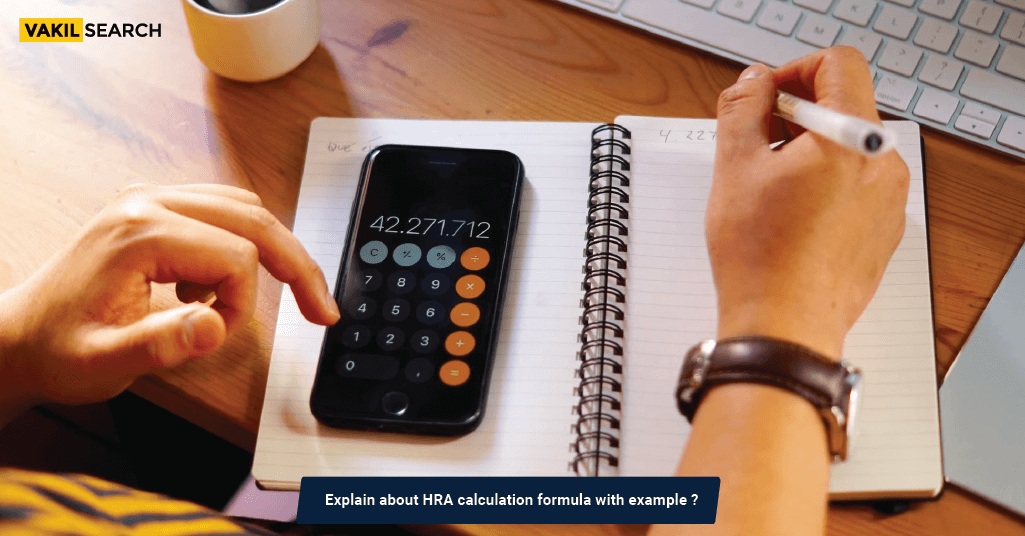House Rent Allowance (HRA) is an important component of an employee's salary in India. Our guide explains the formula, examples, and compliance considerations for HRA calculations.
House Rent Allowance, commonly known as HRA, is a component of your salary that aids in covering the cost of your rented accommodation. For many, HRA becomes an essential part of their financial structure, offering relief from the financial burden of paying rent. To maximize the benefits of HRA calculation, it’s crucial to comprehend how it is calculated and how it impacts your income tax liability.
What is an HRA Calculator?
An HRA calculator is a tool designed to simplify the process of determining the HRA tax exemption. It takes into account various factors such as your salary, the actual rent paid, and the city in which you reside to provide you with an accurate estimate of your HRA tax exemption. One such calculator is the Vakilsearch HRA Calculator, a user-friendly tool that ensures you don’t miss out on any potential tax benefits.
How to Use the Vakilsearch HRA Calculator?
Using the Vakilsearch HRA Calculator is a breeze. Follow these steps:
Access the Calculator: Visit the Vakilsearch website and navigate to the HRA Calculator
Enter Details: Provide the necessary details, including your basic salary, HRA received, actual rent paid, and the city in which you live.
Calculate: Hit the “Calculate” button, and the calculator will display your estimated HRA tax exemption.
“Discover your HRA exemption with our efficient HRA deduction calculator. Try it online!”
How to Calculate HRA Tax Exemption in India
While an HRA calculator streamlines the process, understanding the underlying formula can be insightful. The formula to calculate HRA exemption is as follows:
- A minimum of the following three amounts is considered exempt from tax:
- Actual HRA Received: The actual amount of HRA Calculation you receive from your employer.
- 50% of Salary (Basic + DA): Half of your basic salary and Dearness Allowance if you live in a metro city or 40% if you reside in a non-metro city.
- Actual Rent Paid – 10% of Salary: The actual rent you pay minus 10% of your salary.
Formula to Calculate HRA Exemption: With Example
Let’s consider an example to illustrate the formula:
Basic Salary: ₹50,000 per month
HRA Received: ₹20,000 per month
Actual Rent Paid: ₹15,000 per month
City: Non-metro
Using the formula:
50% of Salary: 50% of ₹50,000 = ₹25,000
Actual Rent Paid – 10% of Salary: ₹15,000 – (10% of ₹50,000) = ₹10,000
Minimum of the above two amounts: ₹10,000 (since it’s smaller)
In this scenario, the least of the three values is ₹10,000. Therefore, the HRA tax exemption would be ₹10,000.
How Much of My HRA is Exempt from Tax?
The amount of HRA Calculation exempt from tax depends on the smallest value calculated using the formula mentioned earlier. It’s important to note that if your actual rent paid is less than 10% of your salary, the entire HRA received is taxable.
Conclusion
In the intricate web of taxation, understanding the nuances of HRA calculation can contribute to substantial savings. The advent of HRA calculators, such as the Vakilsearch HRA Calculator, has simplified the process, making it accessible to all. By grasping the formula and leveraging tools like calculators, individuals can maximize their HRA tax exemption, thereby optimizing their financial landscape.
How are HRA and DA Calculated in Basic Salary?
HRA (House Rent Allowance) is a component of your salary designed to cover your rental expenses. DA (Dearness Allowance) is an allowance given to employees to counter the impact of inflation. They are calculated based on predetermined percentages of your basic salary.
What is the HRA Rule for Income Tax?
The HRA rule for income tax stipulates that the least of the following is exempt from tax: Actual HRA received 50% of basic salary (40% if non-metro city) Actual rent paid minus 10% of basic salary
Is It Necessary to Submit My Landlord’s PAN Card to Claim HRA Deduction?
Yes, as per income tax rules, if your annual rent exceeds ₹1 lakh, you need to submit your landlord's PAN (Permanent Account Number) to claim an HRA deduction. If your landlord doesn't have a PAN, you need to provide a declaration stating the same along with other required details.
Other Important Topics:


